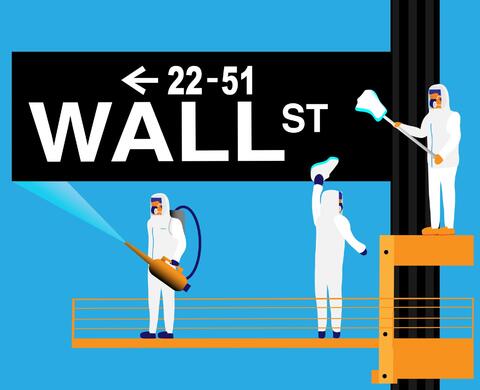
Written by
Published
Category
Key topics
Imperial researchers have found that, if a business is transparent and open, consumers are more likely to behave ethically and responsibly
Does it pay in business to be transparent? Does it make sense for companies to come clean about the bad news as much as it does to share the good? And do consumers care whether businesses are bothered about the future; about making the world a more ethical and greener place?
These questions aren’t straightforward. We live in a cynical age: the public no longer believes businesses when they talk about being “eco-friendly”, we’ve seen too many false claims and we dismiss them as greenwashing. When it was discovered that the information from over 87 million Facebook users might have been used in an attempt to influence voter opinions , there was a public outcry. It emerged the people affected were unaware that for-profit companies were selling their data and politicians were buying their personal information. If Facebook had been open about how it used such data in the first place, could it have salvaged its reputation? Would we be less cynical?
We’ve uncovered some surprising results in our research, which will interest anyone who’s trying to stir the public social conscience.
The truth will set you free
We’ve discovered that, if a business is transparent and open, it’s more likely consumers will in turn behave ethically and responsibly. By transparent, we don’t just mean, say, publishing a list of ingredients – we mean being up front about any negative company news or poor consumer reviews (for instance) and making that information easily accessible. It means owning up if working conditions or supply chains aren’t what they should be.
When consumers are interested in a purchasing decision and care about it, we find that transparency always pays off – regardless of whether a company scores high or low in social responsibility
Even more surprisingly, we found that, if a company is obviously open and concerned about the future – and how its actions will have an impact on our lives in the years to come – then we’re even more likely to become “better” consumers: more concerned about the future of the planet and generations to come than, say, getting the best price regardless of the human or environmental cost. Google, Tencent, and Elon Musk’s Tesla Motors and SpaceX are prime examples of such future-facing businesses.
By being transparent and also keeping an eye on the future, companies amplify these beneficial qualities within consumers. This is certainly surprising at a time when suspicions of business are high.
Happy cows
Fast food giant McDonald’s has launched two pilot programmes in North America, focused on sustainability in its beef supply. According to Fortune :
“One will attempt to measure beef sustainability through the entire supply chain in a research initiative conducted by the Noble Foundation. The other is a $4.5 million matching grant program [sic] run by a group of researchers to test grazing [sic] practices that can lead to a negative carbon impact.”
McDonald’s is conducting a very transparent campaign, openly sharing the pros and cons of its products and manufacturing processes. It wants to signal that it has nothing to hide.
Over-the-top claims about being socially responsible, saving the planet and the rest have run their course
In the current context of rapid technological change, transparency is relevant not only to business but policymakers, NGOs and other organisations. It’s no secret, for example, that more companies and government agencies want to use technology to increase trust in their activities: it may allow local residents to track their medical prescriptions, or increase citizens’ trust in electoral systems.
To be clear, this work isn’t about selling more goods or doing more business. In our research, we’ve only asked how people might make buying decisions as consumers more generally, not whether they’d buy more goods from a certain company. We haven’t looked at how these issues affect companies’ bottom line, and we haven’t tracked people to see if they practise what they preach – we’ve taken their behaviour at their word.
Death to the greenwash!
There are exceptions. We’ve looked at two different types of buying decisions: products with which the consumer feels involved (and for this we looked specifically at mobile phones, so prominent in people’s lives), and products that inspire less emotional attachment (and for this we went for takeaway coffee, though doubtless some consumers feel a great deal of love for their morning mocha).
If not backed up with action, overemphasising corporate social responsibility activities, or highlighting how wonderful one is in being ethical, is likely to backfire
Interestingly, if a company is seen as low in social responsibility and consumers are not very involved in the consumption of its product, transparency backfires. Specifically, consumers are less likely to engage in sustainable and responsible consumption.
On the flip side, when consumers are interested in a purchasing decision and care about it, we find that transparency always pays off – regardless of whether a company scores high or low in social responsibility. We find this result intriguing: it shows that transparency is potentially more powerful than we expected.
This research is particularly timely because, on the one hand, consumers want to behave ethically; they want to be responsible citizens concerned for the future. But, at the same time, they no longer trust business blindly. Over-the-top claims about being socially responsible, saving the planet and the rest have run their course. Too many companies have tried to pull the wool over our eyes with false environmental credentials and we’re wise to it. If not backed up with action (i.e. if there is a lack of transparency), overemphasising corporate social responsibility activities, or highlighting how wonderful one is in being ethical, is likely to backfire.
McDonald’s wants to signal that it has nothing to hide
If you look at companies such as Amazon or Apple, they don’t disguise the fact they don’t have wonderful working conditions for many staff. But they are also perceived as companies that are focused on the future. Could this account for their enduring consumer success? That’s another avenue of research.
With all this in mind, it seems Facebook might have been better off not trying to shirk responsibility for its actions (or lack thereof). Consumers may well have been more accepting if the company had been more transparent about how it used their data.
All this shows what an important role business commands in society: we are not just influenced by parents or friends. And it pays for companies to be open, transparent and to operate with all our futures in mind. In the right conditions, companies can actually serve as positive role models. We find this terribly encouraging.
This article draws on finding from “Blinds up or down?: The influence of transparency, future orientation, and CSR on sustainable and responsible behaviour”, published as the lead article in a special issue of the European Journal of Marketing on “in search of sustainable and responsible consumption”.



